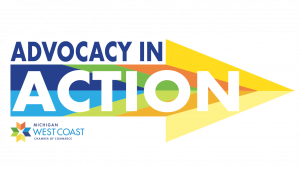 Friday morning Public Policy meetings are never the same thing twice. Members gather at the standard West Michigan crack of dawn hour to look at real issues that have direct influences on how we operate our businesses and support our community. Within the confines of the Chamber Learning Lab, one can learn about issues from urban planning to immigration to taxation, and any number of issues in between. Last week we took on issues that stretched from our backyard all the way up to policies that affect businesses and taxpayers across the state.
Friday morning Public Policy meetings are never the same thing twice. Members gather at the standard West Michigan crack of dawn hour to look at real issues that have direct influences on how we operate our businesses and support our community. Within the confines of the Chamber Learning Lab, one can learn about issues from urban planning to immigration to taxation, and any number of issues in between. Last week we took on issues that stretched from our backyard all the way up to policies that affect businesses and taxpayers across the state.
First, we took a deep dive, literally, into the millage proposal put forth by the Holland Community Aquatic Center. Jack Huisingh and Bob Miller joined us to fill in the details that go along with the proposal that’s aiming to raise $26 million to invest in upgrading the pool’s aging facility and expand the organization’s programs and services.
Fundamental to the mission of the facility is community wellness. A key component of the now 50-year old aquatic center is the public/private partnership that provides free swimming lessons to 3,500 children who attend school in the city of Holland. It’s a program that keeps our kids safe in the water and saves schools the cost of providing the lessons themselves. Adding on to the current facility would allow the center to expand those programs to include schools that they are not able to serve at this time, due to capacity. It would also provide the capacity necessary to allow the public to use the pool on a daily basis.
This world class facility is among the top destinations in the nation for competitive swim events. A recent economic impact study revealed that the events held at the aquatic center bring $6.5 million into our community as visitors stay in our hotels, eat in our restaurants, gas up their cars and shop in our stores. These large-scale events provide the funds that allow the aquatic center to be self-sustaining, but there is also a heavily reliance on philanthropy to run the organization, which is no guarantee of long-term sustainability.
The campaign is called “Every Age, Every Family, Every Day”. It is based partly around the premise that the current facility is self-sustaining, but reliant on large scale competitive events to stay that way, and that each time the facility is booked for events, it is closed to the community. When doors are closed to the community, it ceases to be an asset to residents and also turns away revenue that would otherwise help support the organization. Holland residents will vote on the millage proposal on May 7. Between now and May 7, the aquatic center will hold twelve events to discuss the proposed project with the voters. Check their website for more details. (hollandaquaticcenter.org)
We went from local to state-wide issues when Poppy Hernandez, the Regional Director of Community Affairs for Governor Whitmer’s office shared the new administration’s budget presentation. The freshly minted budget begins with the premise that Michigan’s general fund was not designed to grow with the rate of inflation and needs to be bolstered to address issues ranging from infrastructure investment to the talent skills gap. The presentation showed that Michigan’s General Fund would be more than $5 billion higher if it had merely kept up with inflation since 2000.
 The budget is based on the following goals, to be achieved by 2030.
The budget is based on the following goals, to be achieved by 2030.
- 90% of state roads will be in good/fair condition with additional resources provided for local roads.
- Every community will have clean drinking water.
- 60% of students will attain post-secondary education, training or certification.
- Michigan will a top ten state in third grade literacy.
Our members posed questions about the proposed gas tax, changes to the taxes on small businesses, and policies surrounding education and early childhood intervention. A major topic of conversation was regarding transparency on allocation of resources and making sure that the money is spent in the places it is intended to fund, and not diverted elsewhere. There will be much more to come regarding Michigan’s budget, and we will continue to provide opportunities for our members to bring their comments, questions and concerns directly to state policy makers.
Interested in making these types of connections and voicing your opinion? Join us at any Public Policy or Governmental Affairs event, or contact us directly to ask how we can help you connect on issues that matter to your business.
